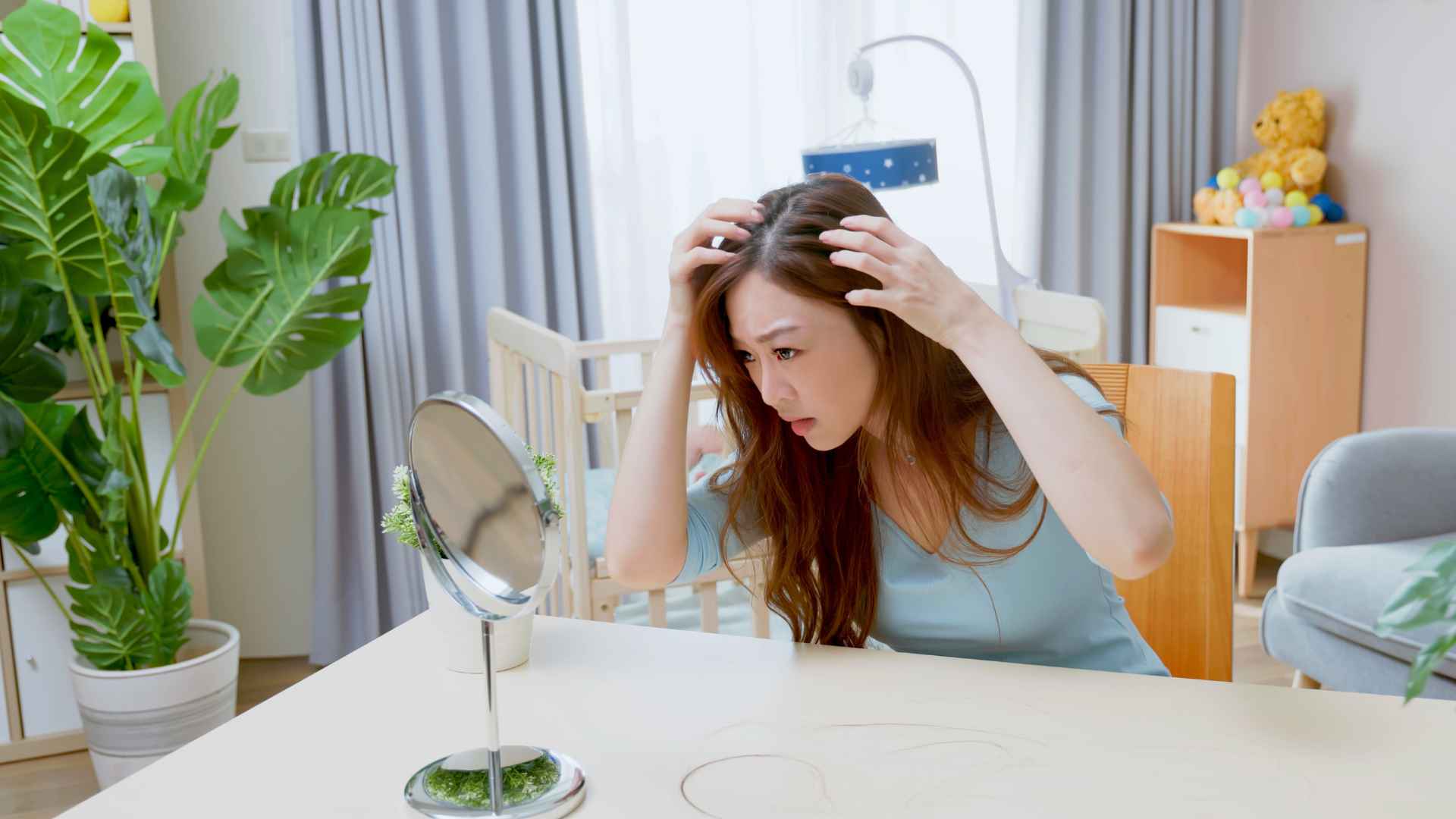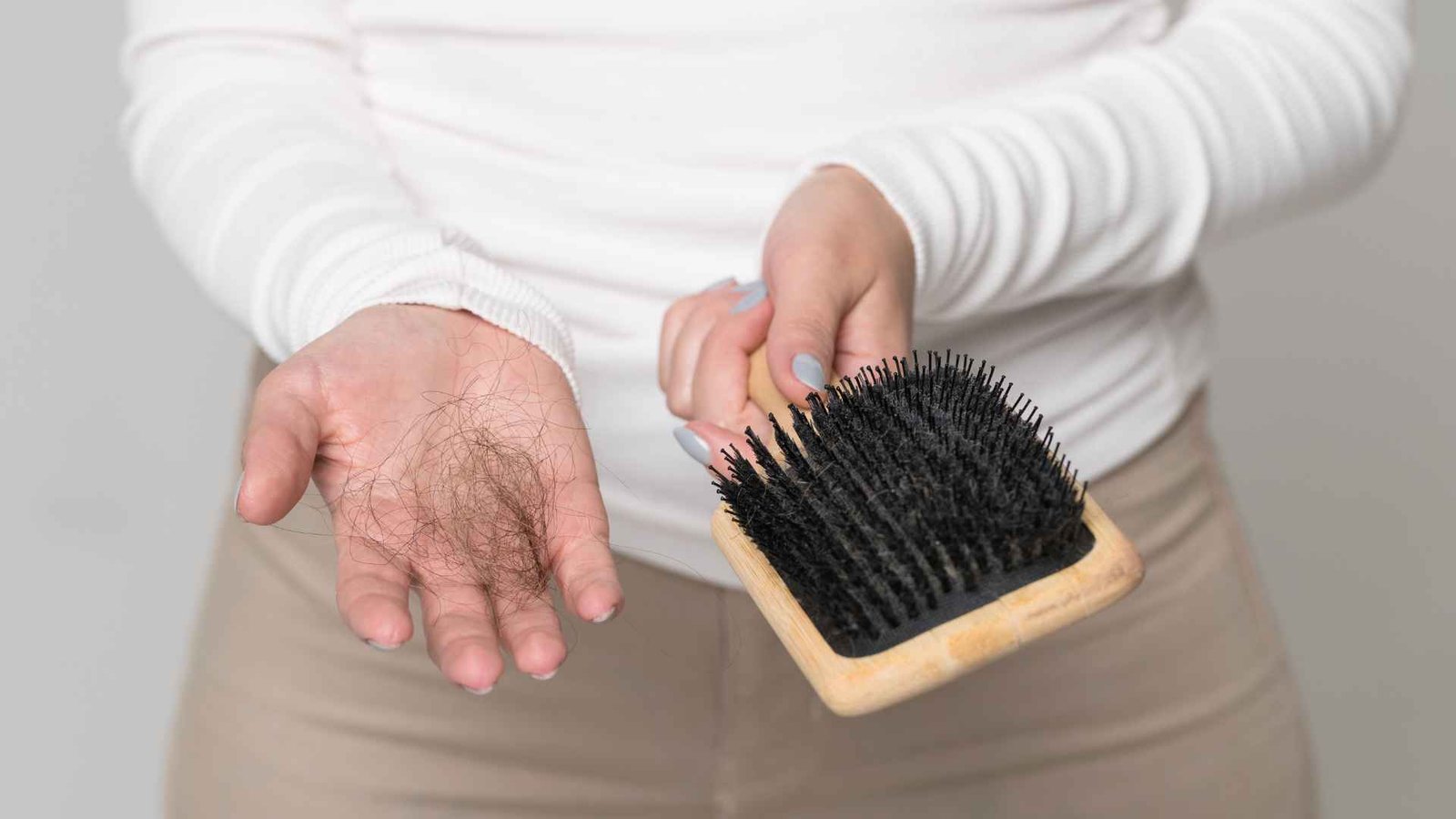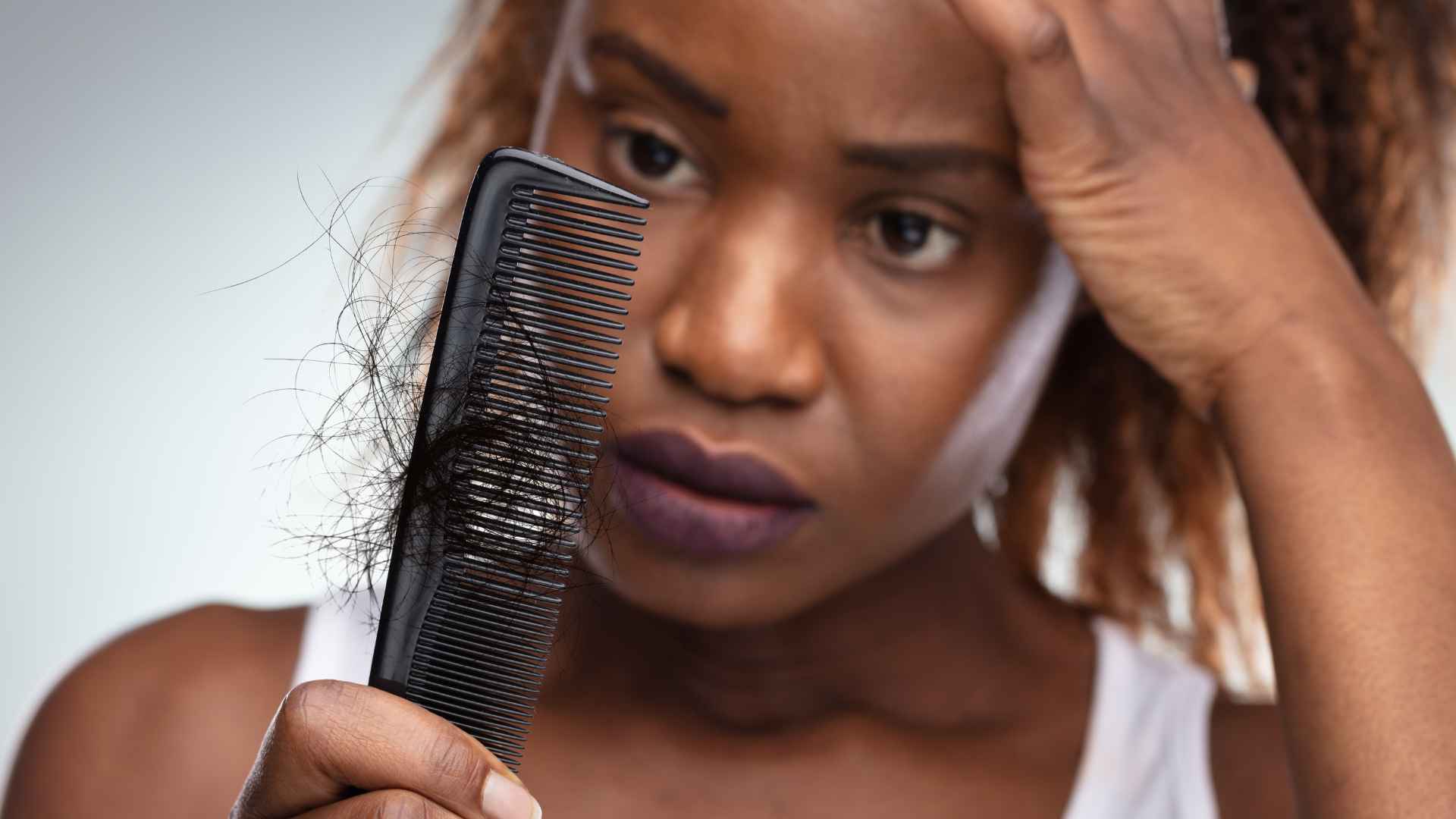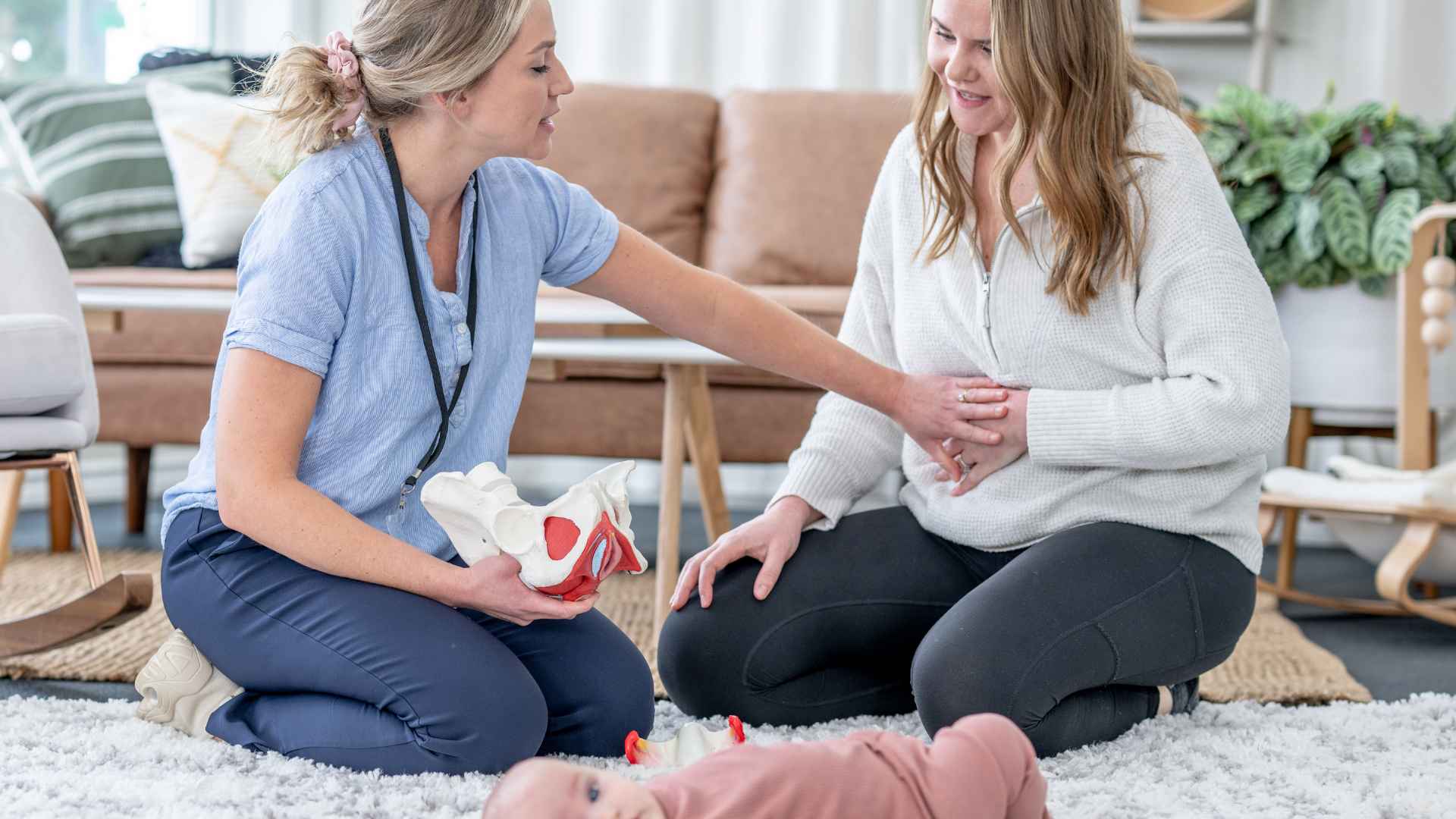Postpartum hair loss is a common phenomenon experienced by many women after giving birth. It is a temporary condition characterized by excessive hair shedding, which can be distressing for new mothers. This article aims to address the concerns and questions raised by women during this phase of postpartum hair loss.
We will provide information and insights on when postpartum hair loss typically stops and offer reassurance to women going through this natural process. Understanding the normal course of postpartum hair loss can help alleviate concerns and provide peace of mind during this transitional period.
What Is Postpartum Hair Loss?

Postpartum hair loss, also known as postpartum shedding or telogen effluvium, refers to the excessive shedding of hair that occurs in women after giving birth. Let’s delve into the details:
Causes of Postpartum Hair Loss:
- Hormonal Changes: During pregnancy, elevated levels of estrogen prolong the hair growth phase, resulting in thicker, fuller hair. After childbirth, hormone levels shift, leading to a return to the normal hair growth cycle. This transition can trigger excessive hair shedding.
- Telogen Effluvium: Postpartum hair loss is primarily attributed to telogen effluvium, a temporary condition where more hair follicles enter the resting (telogen) phase and subsequently shed. It occurs due to hormonal fluctuations and the body’s response to the stress of childbirth.
Hormonal Changes and Hair Loss:
- During pregnancy, hormonal changes prolong the hair’s growth phase, resulting in reduced shedding and thicker hair.
- After childbirth, the decline in estrogen levels triggers a return to the normal hair growth cycle, causing increased shedding.
- This shedding phase typically occurs around three to six months postpartum but can vary for each woman.
Normal Physiological Process:
- It is essential to emphasize that postpartum hair loss is a normal physiological process experienced by the majority of women after giving birth.
- The excessive shedding may be concerning, but it is typically temporary and should not be a cause for alarm.
- Understanding that postpartum hair loss is a natural occurrence can help alleviate any worries or anxiety associated with the condition.
By recognizing postpartum hair loss as a normal part of the postnatal period, women can find reassurance in knowing that their hair will eventually regain its normal growth cycle and density.
Understanding the Hair Growth Cycle
The hair growth cycle consists of three phases: anagen (growth phase), catagen (transition phase), and telogen (resting phase). Let’s explore each phase and its relevance to postpartum hair loss:
Anagen Phase (Growth Phase):
- The anagen phase is the active growth phase of the hair follicles.
- During pregnancy, elevated hormone levels, particularly estrogen, can prolong the anagen phase, resulting in reduced shedding and thicker, fuller hair.
- This explains the luscious, voluminous hair that many women experience during pregnancy.
Catagen Phase (Transition Phase):
- The catagen phase is a short transitional phase between the anagen and telogen phases.
- During this phase, the hair follicle prepares for the telogen phase, and growth slows down.
Telogen Phase (Resting Phase):
- The telogen phase is a resting phase where the hair follicle remains dormant.
- After the telogen phase, old hairs shed to make way for new hair growth.
- Postpartum hormonal changes trigger the transition of a large number of hair follicles into the telogen phase, resulting in excessive shedding.
- This shedding is part of the normal hair growth cycle and is known as postpartum hair loss or telogen effluvium.
The hormonal fluctuations during pregnancy and the subsequent postpartum period play a significant role in the hair growth cycle. The prolonged anagen phase during pregnancy leads to thicker hair, while the hormonal shift after childbirth triggers the transition to the telogen phase, resulting in excessive shedding. Understanding these changes can help new mothers realize that postpartum hair loss is a temporary phase and part of the natural hair growth cycle.
When Does Postpartum Hair Loss Start?
Postpartum hair loss, also known as postpartum telogen effluvium, is a common phenomenon that many women experience after giving birth. Understanding the timeline for the onset of postpartum hair loss can help new mothers prepare for this temporary condition.
Typically, hair shedding after childbirth begins around three to four months postpartum. This delay is due to the hormonal changes that occur during pregnancy. During pregnancy, elevated levels of hormones, particularly estrogen, cause the hair to remain in the growth phase for a longer duration. This leads to a reduction in hair shedding and gives the appearance of thicker, fuller hair.
However, after childbirth, hormone levels start to normalize, and the hair that was in the prolonged growth phase enters the resting phase. This transition triggers the shedding of excess hair. The delayed onset of postpartum hair loss is because it takes time for the hair cycle to readjust and for the affected hairs to enter the shedding phase.
It’s important to note that the exact timeline for the onset of postpartum hair loss can vary among individuals. While three to four months is the typical timeframe, some women may experience hair shedding earlier, while others may notice it later. The duration and intensity of hair loss can also vary. Some women may experience a milder form of shedding that lasts for a shorter period, while others may notice more significant hair loss that persists for several months.
It’s crucial for new mothers to understand that postpartum hair loss is a temporary condition and not a cause for significant concern. The hair growth cycle will eventually normalize, and the shedding will subside. However, if the hair loss is excessive, prolonged, or accompanied by other concerning symptoms, it is advisable to seek medical advice from a healthcare professional.
In summary, postpartum hair loss typically starts around three to four months after childbirth. This delay is due to hormonal changes during pregnancy. However, the timeline may vary among individuals, and the duration and intensity of hair loss can differ as well. While postpartum hair loss can be distressing, it is important to remember that it is a temporary condition that resolves on its own over time.
How Long Does Postpartum Hair Loss Last?

Postpartum hair loss, also known as postpartum telogen effluvium, is a common occurrence among women after giving birth. It is characterized by excessive hair shedding, which can be alarming for new mothers. However, it is important to understand that postpartum hair loss is a temporary condition and usually resolves on its own.
In general, most women experience hair shedding for around three to six months after childbirth. This shedding phase typically occurs because of hormonal changes that take place during pregnancy. During pregnancy, elevated hormone levels cause hair to remain in the growth phase, resulting in thicker and fuller hair. However, after giving birth, hormone levels return to normal, and the hair that was in the prolonged growth phase enters the resting phase (telogen phase). This shift in hair cycle causes the excessive shedding.
The duration of postpartum hair loss may vary from woman to woman. Some women may notice significant shedding that lasts for several months, while others may experience a milder form of hair loss that resolves more quickly. It is essential to keep in mind that this shedding is a natural part of the hair growth cycle and is not indicative of a serious underlying health issue.
Once the shedding phase is complete, hair regrowth usually begins. The regrowth process can take several months as new hair follicles develop and the hair cycles normalize. It is common for the regrowth hair to have a different texture or even appear differently than before. For example, some women may notice changes in hair color or thickness. However, over time, the hair typically returns to its pre-pregnancy state.
While postpartum hair loss can be distressing for new mothers, it is important to remember that it is a temporary condition. There are a few things women can do to manage this process and support healthy hair growth, such as maintaining a balanced diet, practicing gentle hair care routines, and avoiding hairstyles that put excessive stress on the hair. In case of concerns or if the hair loss persists beyond six months, it is advisable to consult a healthcare professional for further evaluation and guidance.
In summary, postpartum hair loss is a common occurrence after giving birth. Most women experience hair shedding for around three to six months postpartum due to hormonal changes. Hair regrowth typically begins after the shedding phase is complete. While the duration may vary, it is important to understand that postpartum hair loss is a temporary condition, and with time, the hair usually returns to its pre-pregnancy state.
5 Tips for Coping with Postpartum Hair Loss

Dealing with postpartum hair loss can be challenging, but there are practical strategies you can implement to manage and cope with this temporary condition. Here are some tips to help you navigate postpartum hair loss:
- Be Gentle with Your Hair: Opt for mild, gentle shampoos and conditioners that are free from harsh chemicals. Avoid excessive heat styling tools such as curling irons or straighteners, as they can further weaken the hair. Instead, embrace natural hairstyles or consider air-drying your hair whenever possible.
- Minimize Tension and Hair Pulling: Avoid hairstyles that pull on your hair, such as tight ponytails, buns, or braids. These styles can put excessive stress on the hair follicles and worsen hair loss. Opt for looser hairstyles that don’t strain the hair, and use hair accessories, like scrunchies or clips, that don’t pull or tug on the hair.
- Maintain a Healthy Diet: Eating a balanced and nutritious diet is crucial for promoting healthy hair growth. Include foods rich in vitamins, minerals, and proteins, which are essential for hair health. Incorporate foods like lean meats, fish, eggs, nuts, seeds, fruits, vegetables, and whole grains into your meals. Consult with a healthcare professional or a registered dietitian for personalized dietary recommendations.
- Consider Hair Supplements: In consultation with your healthcare provider, you may explore the option of taking hair supplements that contain ingredients like biotin, vitamins, and minerals specifically formulated to support hair growth. However, it’s important to consult a healthcare professional before starting any new supplements, as they can interact with medications or have other considerations based on your individual health.
- Seek Emotional Support: Postpartum hair loss can be emotionally distressing for some women. If you find that the hair loss is causing significant distress or affecting your self-esteem, consider seeking emotional support from your partner, family, or friends. Talking to other new mothers who have experienced postpartum hair loss can also provide reassurance and a sense of community. If needed, don’t hesitate to consult with a healthcare professional or a dermatologist who can offer guidance and support.
Remember, postpartum hair loss is a temporary condition, and with time, your hair will regain its normal growth cycle. By adopting gentle hair care practices, maintaining a healthy diet, and seeking emotional support when needed, you can effectively manage and cope with postpartum hair loss.
Other Factors to Consider That Can Influence the Duration and Severity of Postpartum Hair Loss
When it comes to postpartum hair loss, it’s important to recognize that individual variations and other factors can influence the duration and severity of the condition. Here are some additional factors to consider:
- Individual Differences: Every woman’s experience with postpartum hair loss can be unique. While many women go through a period of increased hair shedding, the intensity and duration can vary. Factors such as hormonal fluctuations, hair growth cycle, and overall health can contribute to these individual differences.
- Genetics: Genetics play a role in determining the thickness and density of your hair. If you have a family history of hair loss or thinning, you may be more prone to experiencing more noticeable postpartum hair loss. However, it’s important to remember that postpartum hair loss is usually temporary, even if genetics may influence the extent of shedding.
- Breastfeeding: Breastfeeding can also influence postpartum hair loss. Some women may notice that their hair loss is more pronounced while they are breastfeeding. This can be attributed to hormonal changes associated with lactation. However, the impact of breastfeeding on hair loss can vary among individuals.
- Overall Health: Your overall health and well-being can affect the health of your hair. Nutritional deficiencies, thyroid imbalances, stress, and other health conditions can contribute to hair loss or hinder the regrowth process. Maintaining a healthy lifestyle, managing stress, and addressing any underlying health concerns can support hair health and the recovery from postpartum hair loss.
It’s important to remember that postpartum hair loss is a temporary condition, and in most cases, hair growth gradually returns to normal over time. While the shedding phase can be distressing, it is typically a normal part of the postpartum journey. Patience is key during this period, as it can take several months for the hair growth cycle to normalize and for new hair to grow in.
If you have concerns about the severity or duration of your postpartum hair loss, or if you notice other accompanying symptoms, it is advisable to consult with a healthcare professional or a dermatologist. They can evaluate your specific situation, provide reassurance, and offer further guidance if necessary.
In summary, postpartum hair loss can be influenced by individual differences, genetics, breastfeeding, and overall health. However, with time, hair growth will gradually return to normal. Patience and understanding that postpartum hair loss is a temporary condition can help alleviate any concerns you may have.
Watch When does postpartum hair loss stop | Video
Top 5 FAQs and answers related to when does postpartum hair loss stop
When does postpartum hair loss stop?
Postpartum hair loss typically lasts for around three to six months. However, the exact duration can vary among individuals. Hair shedding usually subsides once the hair growth cycle returns to normal, and new hair starts to regrow.
Is there anything I can do to make postpartum hair loss stop sooner?
Unfortunately, there is no guaranteed way to make postpartum hair loss stop sooner, as it is a natural process. However, practicing gentle hair care, maintaining a healthy diet, and ensuring overall well-being can support hair health and potentially expedite the regrowth process.
Does breastfeeding affect when postpartum hair loss stops?
Breastfeeding can influence postpartum hair loss, but its impact varies among individuals. Some women may experience more pronounced hair shedding while breastfeeding due to hormonal changes. However, hair loss should gradually resolve once hormonal fluctuations stabilize, regardless of breastfeeding status.
What if my postpartum hair loss continues beyond six months?
While postpartum hair loss typically resolves within six months, individual variations exist. If you notice excessive or prolonged hair shedding beyond this timeframe or have concerns, it is advisable to consult a healthcare professional or a dermatologist for a thorough evaluation and personalized guidance.
Will my hair return to its pre-pregnancy state once postpartum hair loss stops?
Yes, in most cases, hair will eventually return to its pre-pregnancy state once postpartum hair loss stops and the hair growth cycle normalizes. However, it’s important to note that some changes in hair texture or thickness may occur temporarily during the regrowth process. These changes are usually temporary and resolve over time.
Conclusion

In conclusion, postpartum hair loss is a common and temporary condition that many women experience after giving birth. Let’s recap the key points discussed in this article:
- Postpartum hair loss typically lasts for around three to six months, with hair shedding starting around three to four months after childbirth.
- The duration and intensity of postpartum hair loss can vary among individuals, influenced by factors such as hormones, genetics, breastfeeding, and overall health.
- After the shedding phase is complete, hair regrowth begins. It may take several months for new hair to fully grow and for the hair growth cycle to normalize.
- Coping with postpartum hair loss involves practicing gentle hair care, avoiding excessive heat styling and tension on the hair, and maintaining a healthy diet rich in nutrients that support hair growth.
- It’s important to remember that postpartum hair loss is a temporary phase. Patience and self-care are key during this time. Seeking emotional support from loved ones and healthcare professionals can be beneficial if the hair loss is causing distress.
To all the new mothers experiencing postpartum hair loss, remember that you are not alone. This is a natural process, and your hair will gradually return to its pre-pregnancy state. Take care of yourself, focus on your overall well-being, and embrace the natural hair growth process. Reach out for support if needed, as there are resources available to guide and reassure you throughout this journey.
You are doing an amazing job as a new mother, and your hair will recover in due time. Be kind to yourself and remember that your worth extends far beyond your appearance.
Please share this When Does Postpartum Hair Loss Stop? Guide with Tips with your friends and do a comment below about your feedback.
We will meet you on next article.
Until you can read, Does Smoking Cause Hair Loss? Its Impacts on Hair Health
